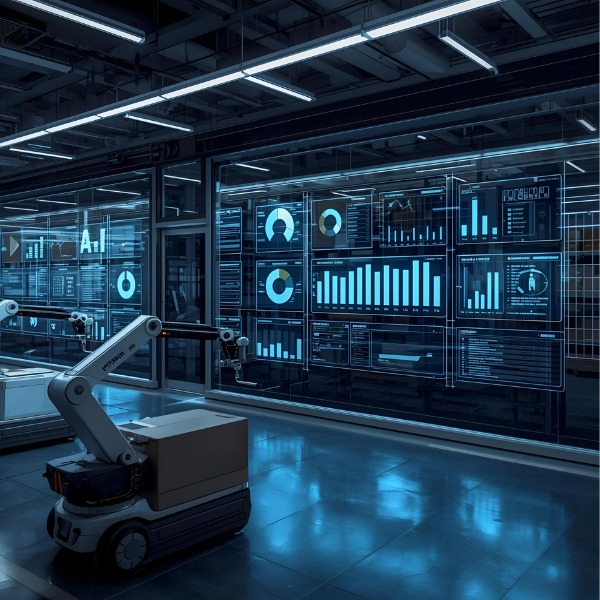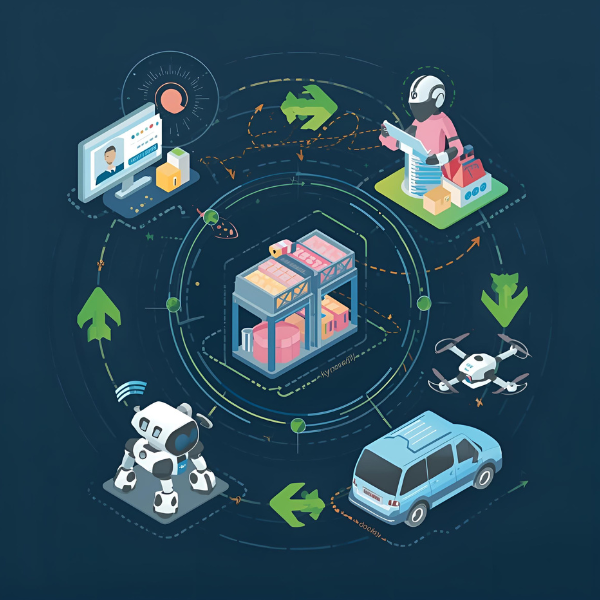
How AI Transforms E-Commerce | BrightDove Insights
How AI is Transforming E-Commerce: From Personalization to Logistics
The e-commerce landscape is more crowded and competitive than ever. Standing out requires more than just a great product and a functional website; it demands a deep understanding of customer needs and operational excellence. This is where artificial intelligence moves from a buzzword to a fundamental business asset. As an AI development team, we see firsthand how intelligent systems are not just enhancing e-commerce but completely revolutionizing it, from the first customer click to the final package delivery.
This post will guide you through the most impactful ways AI is reshaping the online retail industry. We will explore how it powers hyper-personalized shopping experiences, optimizes pricing strategies, streamlines inventory management, and makes logistics smarter. For business leaders, understanding these transformations is key to building a resilient, profitable, and future-ready e-commerce operation.
Powering Hyper-Personalization at Scale
Generic shopping experiences are a thing of the past. Today’s consumers expect brands to understand their preferences and anticipate their needs. AI makes this possible by analyzing vast amounts of user data—browsing history, past purchases, items viewed, and even mouse movements—to create a unique shopping journey for every individual.
AI-Driven Recommendation Engines
One of the most visible applications of AI in e-commerce is the recommendation engine. Think of Amazon’s “Customers who bought this also bought” or Netflix’s personalized content suggestions. These systems use machine learning algorithms, specifically collaborative filtering and content-based filtering, to predict which products a user is most likely to be interested in. A well-tuned recommendation engine, developed with a deep understanding of these models, can significantly increase average order value and customer loyalty. It’s not just about showing more products; it’s about showing the right products at the right time.
Personalized Search and Visual Search
AI also enhances the search bar, turning it from a simple keyword matcher into an intelligent discovery tool. By using Natural Language Processing (NLP), AI can understand the intent behind a customer’s query, even if it’s vague or misspelled. It can then deliver more relevant results. Furthermore, visual search capabilities allow customers to upload a photo of an item they like, and the AI will find similar products in your inventory. This creates a seamless and intuitive discovery process that mimics how people find inspiration in the real world.

Optimizing Pricing and Promotions with Dynamic Models
Setting the right price is a delicate balance. Price too high, and you lose customers; price too low, and you leave money on the table. AI-powered dynamic pricing models remove the guesswork. These systems analyze a multitude of real-time variables, including competitor pricing, market demand, inventory levels, customer behavior, and even the time of day.
Based on this analysis, the algorithm can automatically adjust prices to maximize revenue and profit margins. For example, it might slightly lower the price of a popular item to be more competitive or increase the price of a product with low stock and high demand. This level of granular, real-time optimization is impossible to achieve manually and represents a significant competitive advantage. As developers, we build these models to align with specific business goals, ensuring they drive profitability without eroding brand trust.
Streamlining Inventory and Supply Chain Management
Few things are more damaging to an e-commerce business than stockouts or overstocking. AI brings a new level of precision to inventory management, helping businesses maintain optimal stock levels and a more efficient supply chain.
AI-Powered Demand Forecasting
Traditional forecasting often relies on historical sales data, which can be unreliable in a fast-changing market. AI models can create far more accurate predictions by analyzing a wider range of data, including upcoming holidays, social media trends, competitor promotions, and even weather patterns. This allows businesses to anticipate surges in demand and adjust their inventory accordingly, preventing lost sales due to stockouts and reducing the capital tied up in slow-moving products.
Warehouse Automation
Inside the warehouse, AI is the brain behind the robotic workforce. Automated systems powered by AI can sort, pick, and pack orders with incredible speed and accuracy. AI-optimized routing algorithms guide robots through the most efficient paths in the warehouse, reducing order fulfillment times. This not only cuts labor costs but also ensures that customers receive their orders faster, leading to higher satisfaction.

Making Logistics and Delivery Smarter
The “last mile” of delivery is often the most expensive and complex part of the e-commerce journey. AI is instrumental in optimizing this final step, ensuring packages get to customers quickly and cost-effectively.
Route optimization algorithms analyze traffic conditions, delivery windows, vehicle capacity, and dozens of other factors to calculate the most efficient delivery routes for a fleet of drivers. This reduces fuel costs, minimizes delivery times, and increases the number of deliveries a single driver can make in a day. Furthermore, AI can provide customers with more accurate delivery time estimates, reducing “where is my order?” inquiries and improving the post-purchase experience.
Actionable Insights for Your Business
Integrating AI into your e-commerce strategy can seem daunting, but it’s an incremental process.
- Start with Your Data: Assess the quality and accessibility of your customer and operational data. Clean, well-organized data is the fuel for any successful AI implementation.
- Identify a Key Pain Point: Don’t try to implement everything at once. Start with one area where AI can have a significant impact. Is it customer churn? Inefficient fulfillment? Choose a problem and focus on solving it with a targeted AI solution.
- Partner with Experts: Building and deploying effective AI models requires specialized expertise. Working with an experienced AI development team can help you navigate the technical complexities and ensure your AI initiatives deliver a measurable return on investment.
Conclusion: Building the Future of Retail
Artificial intelligence is no longer an optional add-on for e-commerce; it is a core component of a modern, competitive retail strategy. From creating deeply personal shopping experiences to building a hyper-efficient supply chain, AI provides the tools to not only meet but exceed customer expectations.
The businesses that thrive in the coming years will be those that leverage AI to turn their data into actionable insights and intelligent automation. By strategically implementing these technologies, you can drive revenue, cut costs, and build a stronger, more meaningful relationship with your customers.


